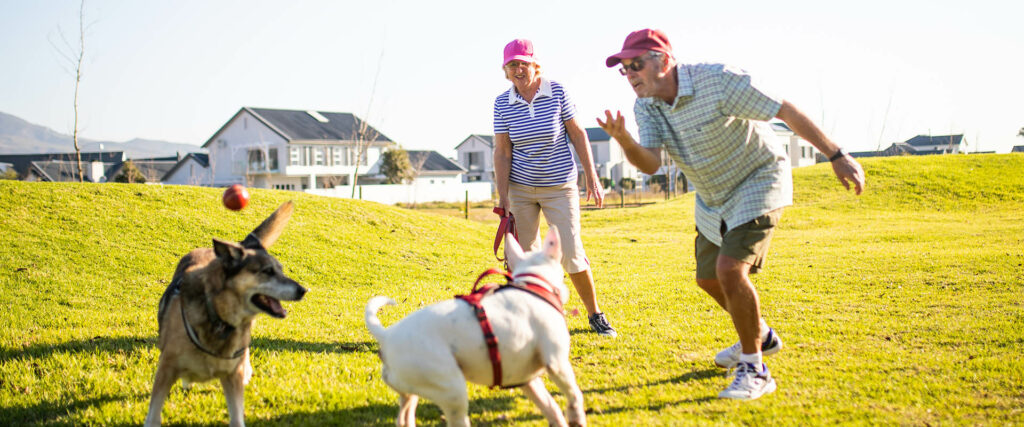Will I be able to keep my pet? For many pet owners who are looking at buying a home in a lifestyle estate or a retirement village, this is a matter of vital importance that could make or break a sale.
Estate living is a growing trend in South Africa as shown also buy the number of lifestyle estates and retirement villages that are being developed. Stats SA 61.3% of all new homes built in Q2 2019 were apartments and townhouses. Global research shows that more buyers want pet-friendly properties – whether they’re buying for the first time, downscaling or retiring. Catering for this demand, especially for older residents, most lifestyle estate and retirement developers now allow residents to keep a cat or a dog subject to rules usually determined by the homeowners’ association.
The benefits of pets for seniors
Research have shown that there are lots of benefits for the elderly in having a pet to look after. Seniors with pets tend to live longer and happier lives, as animals can reduce stress, lower blood pressure and increase social interaction and physical activity. Pets also provide company and companionship, which is especially important for seniors who have lost a partner.
According to Dr Mareanna le Roux, lecturer in the Department of Psychology at Stellenbosch University, the benefits of a loving relationship with dogs are manifold, and even in frail care cases it has been proven to make a significant difference. “Having a pet, and the constant companionship, goes a long way in improving the standard of living for any human being,” she says. “Making the transition to a retirement community can be hard, but even more so if you have to do it without a beloved pet.”
More retirement estates allow pets
“For true pet lovers, not being able to move in with your pets would be a deal breaker,” says Garry Reed, managing director of Evergreen Lifestyle Villages Amenities. Their retirement villages adopted this reality 10 years ago and is a pet-friendly retirement brand. “To many seniors, pets are their best friends and to some they are like children. At Evergreen, you may bring your pets with you, provided you are staying in a house, cottage or ground-floor apartment.”
Other developers following the pet-friendly trend include Devmark and Rabie, within all of their retirement developments, Fonteine Village, Helderberg Manor, Lazuli Lifestyle & Retirement Estate, The Plettenberg Manor, and Shoreline Sibaya. “We find the pet-friendly topic is a big positive for us in the age bracket for retirement villages,” says Devmark Property Group national sales manager Bruwer de Jager.
Also read: Pet-friendly estates put family first
Remember to follow the rules
However, if pets continually misbehave or are noisy the owners may lose this privilege. The National Council of SPCA has reported receiving an increasing number of enquiries and complaints from both sides of the debate – from frustrated Trustees experiencing problems with untrained, unsocialised pets, and residents who either can’t bring their pet with them to the development, or have to find a new home for them once they arrive due to revoked permission.
It is therefore advised that prospective home buyers with pets be advised of the rules regarding pets before they make a final decision on whether they want to live there or not. Rules differ between developments, but are mostly concerned with the size and number of pets, and this in turn is often reliant on the size of the home and garden, the availability of communal space in the development, and whether the pets will create a noise disturbance. “In our other security estates where the houses have large gardens, we allow two medium-sized dogs per household, whereas only small dogs are allowed in ground-floor apartments that have small gardens,” says Alda Erasmus, communications manager of the Central Developments Property Group.
Reed says that Evergreen’s pet policies basically boil down to consideration for others. “Pet policies in most communal villages are simply that pets do not become a nuisance to fellow residents, mostly through noise pollution or aggression, that dogs are on a lead when taken for walks on the common property, and that owners ensure that pet poop is picked up and disposed of appropriately.”








